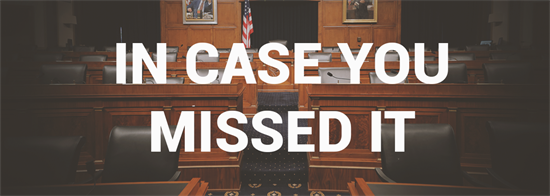ICYMI: The Art of a Banking Compromise
Washington,
March 19, 2018
The Art of a Banking Compromise
On fixing Dodd-Frank, the House shouldn't be a potted plant. By The Editorial Board The crux of Banking Chairman Mike Crapo’s bill would raise the asset threshold for banks that must comply with “enhanced prudential standards”—jargon for stringent stress tests and liquidity requirements—to $250 billion from $50 billion. The bill also eases myriad regulatory requirements on small banks. Elizabeth Warren has berated her Democratic colleagues for shining shoes on Wall Street, but the biggest banks for the most part wouldn’t benefit from this reprieve. The regional and community banks that would be helped don’t present a systemic risk. Most maintain much bigger capital cushions than the global giants since they don’t have a federal backstop. Yet small banks have had to divert human and financial capital to regulatory compliance. The Bank of Commerce in Idaho Falls had to stop offering consumer mortgages due to the cost of hiring new compliance staff. When regional banks get squeezed, the giants sweep up more business, which concentrates more risk in the banking system.
As Democrat Heidi Heitkamp of North Dakota put it, “Dodd-Frank was supposed to have stopped too big to fail, but the net result has been too small to succeed. The big banks have gotten bigger since the passage of Dodd-Frank, and the small banks have disappeared.” The 16 Democrats who voted for the bill’s common-sense reforms are getting flogged by Ms. Warren and ranking Banking Committee Democrat Sherrod Brown, who is aggrieved that he was excluded from negotiations. He excluded himself. Senate Republicans now worry these Democrats will get cold feet if they have to vote again, so they want the House to pass the bill straight up. But the impetus for Dodd-Frank reform originated in the House, and Members there deserve to shape the final product. Last year the House passed the Choice Act that traded fewer regulatory rules for higher capital standards. While that was too bold for most Senate Democrats, House Financial Services Committee Chairman Jeb Hensarling has broken the bill into dozens of bite-size pieces that have passed with huge majorities. Consider the Halos Act, which the House passed by a 344-73 vote and would allow startups to informally pitch angel investors at “demo days” without violating securities laws. Another bill (426-0) would exempt merger and acquisition brokers involved in the sale of small, private firms from federal registration. The Financial Institution Living Will Improvement Act (414-0) would require the Federal Reserve and Federal Deposit Insurance Corporation to disclose publicly how they assess “living wills.” Democrats also backed a bill (395-2) to prevent regulators from choking off politically disfavored businesses from the banking system as the Obama Administration did with payday lenders and gun dealers. The Senate incorporated some House bills but left out these and two dozen others with broad bipartisan backing. House Republicans should be able to attach several of these without endangering Democratic support in the Senate. They also ought to strike a Senate provision that gives custody banks, which safeguard assets for pension funds and institutional investors, special treatment under the Federal Reserve’s capital standards. This would let them increase their leverage. Citibank and J.P. Morgan may also qualify for the exception since they provide custodial services, which could result in a slow erosion of the banking system’s capital firewall. Big banks need more capital to withstand a major financial panic. Minority Leader Chuck Schumer has given Democrats latitude to vote for the Senate bill because they want a bipartisan achievement to run on. But House Republicans also need accomplishments to trumpet beyond tax reform. Senate Republicans should be as willing to accommodate their GOP colleagues as they are Democrats.
|


